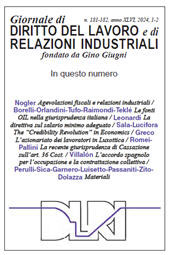Alla ricerca dell'autorità salariale nell'ordinamento italiano
P. 165-191
L'Autore esamina il recente orientamento della Corte di Cassazione secondo cui anche la retribuzione minima stabilita dal contratto collettivo di categoria sottoscritto dalle organizzazioni sindacali maggiormente rappresentative è soggetto al sindacato giudiziale di rispetto dei criteri di sufficienza e proporzionalità di cui all'art. 36 Cost. e, ove non conforme, sostituito con la retribuzione stabilita dal contratto collettivo della categoria più affine. L'Autore argomenta che tale orientamento giurisprudenziale è idoneo ad assicurare la garanzia della sufficienza della retribuzione quale valore assoluto indipendente dal mercato, ma non anche la proporzionalità, che è necessariamente una variabile dipendente dal mercato e dai rapporti di forza tra le parti sociali.
Queste ultime verrebbero di fatto commissariate dal giudice qualora questo fosse legittimato a sostituire integralmente le previsioni in materia di retribuzione di un contratto collettivo con quelle negoziate per una diversa categoria contrattuale. Secondo l'Autore, non solo il giudice, ma anche il legislatore possono ergersi ad autorità salariale soltanto per determinare la retribuzione sufficiente, ma non quella proporzionata che è necessariamente determinata dalle parti sociali seppur sopra la soglia della sufficienza.
È pertanto auspicabile rafforzare il ruolo di quest'ultime, adottando anche per determinare la retribuzione minima garantita dalla Costituzione il metodo applicato per determinare il minimo imponibile per la contribuzione previdenziale in rapporto alla retribuzione stabilita dal contratto più applicato in seno a categorie merceologiche disegnate dal legislatore in corrispondenza ai codici di classificazione delle imprese ai fini statistici e contributivi. [Testo dell'editore]
The Author examines the recent orientation of the Supreme Court of Cassation that even the minimum wage established by the collective bargaining agreement of the category signed by the most representative trade unions is subject to judicial review of compliance with the criteria of sufficiency and proportionality set forth in Article 36 of the Constitution and, where non-compliant, replaced with the wage established by the collective bargaining agreement of the most similar category. The Author argues that this jurisprudential orientation is appropriate to ensure the guarantee of sufficiency of pay as an absolute value independent of the market, but not also proportionality, which is necessarily a variable dependent on the market and the power relations between the social partners.
The latter would be de facto commissaried by the courts if the latter were empowered to fully replace the wage provisions of a collective agreement with those negotiated for a different contractual category. According to the Author, not only the judge but also the law can stand as a wage authority only to determine the sufficient wage, but not the proportionate wage that is necessarily determined by the social partners albeit above the sufficiency threshold.
It is therefore desirable to strengthen the role of the latter by also adopting for determining the minimum wage guaranteed by the Constitution the method applied to determine the minimum wage for social security contributions in relation to the wage established by the most applied contract within product categories drawn by law in correspondence to the classification codes of enterprises for statistical and contribution purposes. [Publisher's text]
-
Artículos del mismo número (disponibles individualmente)
-
Información
Código DOI: 10.3280/GDL2024-181009
ISSN: 1972-5507
KEYWORDS
- Minimum wage, Sufficiency, Proportionality, Judge, Law, Social partners, Category
- Retribuzione minima, Sufficienza, Proporzionalità, Giudice, Legge, Parti sociali, Categoria


